 Unifor selected Domtar as the target company in eastern Canada for the upcoming round of bargaining. In related news: support for BC workers ramps up after Crofton and Chemainus mill curtailments; tariffs mean boom and bust for Maine sawmillers; and Kentucky’s hardwood industry is at risk of collapse. Meanwhile: Canada and China renew cooperation on wood construction; Michigan jump-starts 9 mass timber projects, wood windows are returning to high-end residential architecture; and the US Lumber Coalition says lumber prices are not a factor in housing affordability.
Unifor selected Domtar as the target company in eastern Canada for the upcoming round of bargaining. In related news: support for BC workers ramps up after Crofton and Chemainus mill curtailments; tariffs mean boom and bust for Maine sawmillers; and Kentucky’s hardwood industry is at risk of collapse. Meanwhile: Canada and China renew cooperation on wood construction; Michigan jump-starts 9 mass timber projects, wood windows are returning to high-end residential architecture; and the US Lumber Coalition says lumber prices are not a factor in housing affordability.
In Forestry/Climate news: the Canadian Tree Nursery Association sounds alarm over seedling shortage; Indigenous leaders make their voices heard in BC and Washington; a GOP rep pans Washington state’s barred owl-kill plan; warming enhances soil carbon accumulation in boreal peatlands; NASA confirms northward shift of boreal forests; and more on BC’s forest management report by columnist Tom Fletcher, and ENGO Wildsight.
Finally, Norway spruce trees may not have been anticipating a solar eclipse after all.
Kelly McCloskey, Tree Frog News Editor
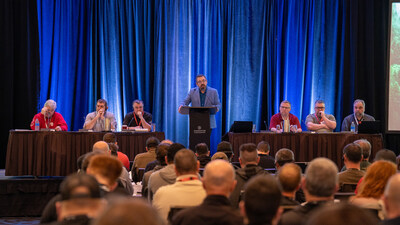
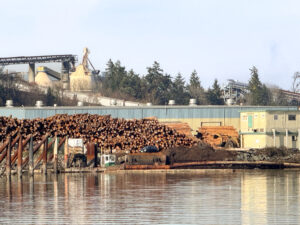 Efforts to support forestry workers displaced by the closure of the Crofton pulp mill and the ongoing curtailment at the Chemainus sawmill are expanding, as local leaders press the federal government for clearer and more robust income supports. The District of North Cowichan says its Mill Closure Response Working Group met for the first time last week, bringing together municipal, provincial and federal representatives, along with labour, industry and impacted workers, to coordinate next steps. …“The stories we heard at the first working group meeting show how urgent this is,” North Cowichan Mayor Rob Douglas said. “This is why we’re continuing to press the federal government to extend employment insurance supports for all impacted workers and to release the forestry industry support funding announced last summer. People need income security while they plan their next steps.” Updates and resources for affected workers and businesses are available at
Efforts to support forestry workers displaced by the closure of the Crofton pulp mill and the ongoing curtailment at the Chemainus sawmill are expanding, as local leaders press the federal government for clearer and more robust income supports. The District of North Cowichan says its Mill Closure Response Working Group met for the first time last week, bringing together municipal, provincial and federal representatives, along with labour, industry and impacted workers, to coordinate next steps. …“The stories we heard at the first working group meeting show how urgent this is,” North Cowichan Mayor Rob Douglas said. “This is why we’re continuing to press the federal government to extend employment insurance supports for all impacted workers and to release the forestry industry support funding announced last summer. People need income security while they plan their next steps.” Updates and resources for affected workers and businesses are available at 
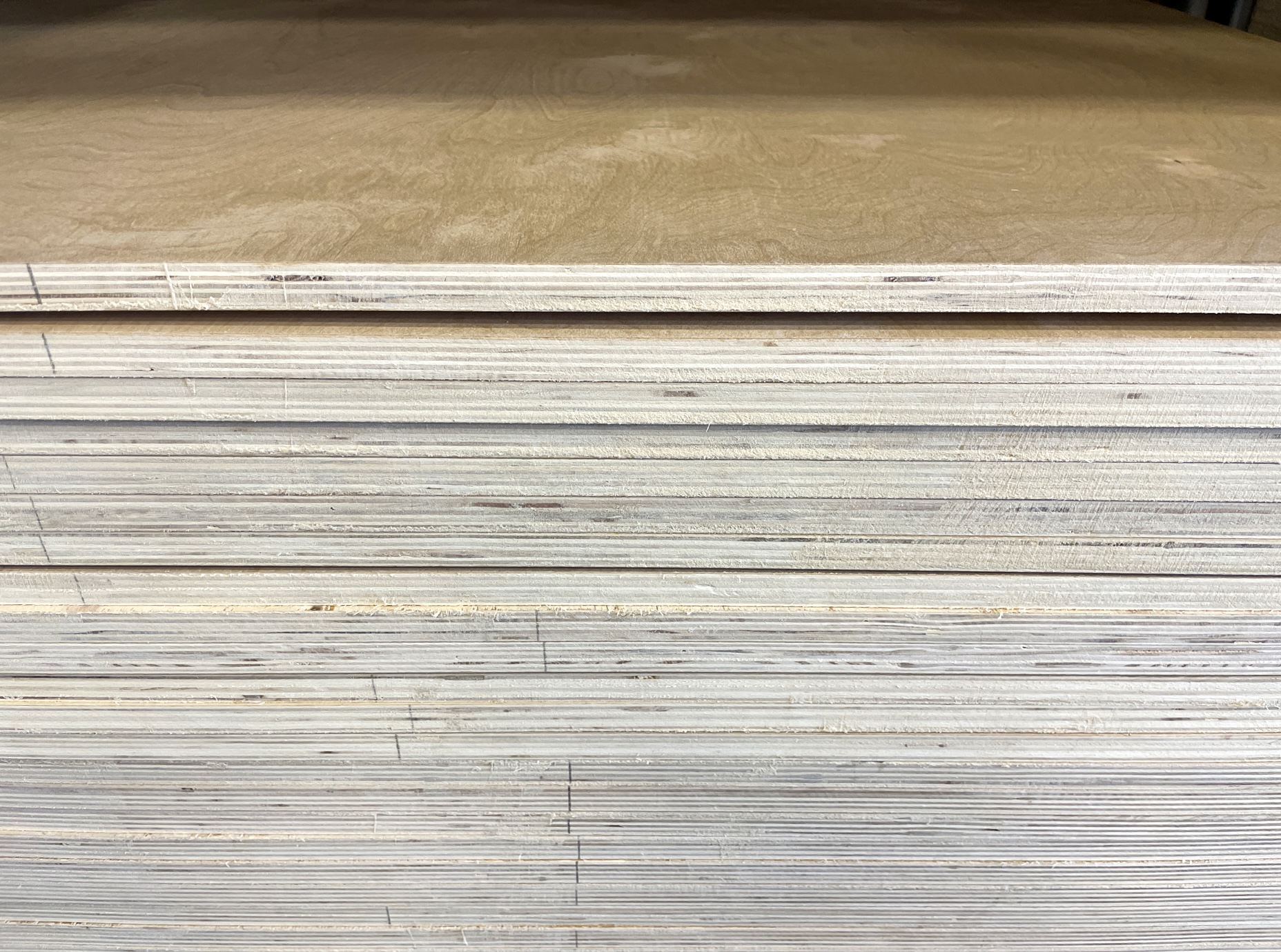 PORTLAND, Ore. – Layoffs are expected at the beginning of April for Roseburg Forest Products Co.’s Riddle Plywood facility, according to a WARN notice filed this week. The notice, filed Feb. 4, says the company expects to permanently lay off 146 team members at the Riddle By-Pass Road location, though the facility will remain open. These layoffs are expected to take place after a 60-day WARN period. The company said April 5 “will be the last day of work for a majority of the affected team members before the layoff and that the remaining affected team members, if any, will be within 14 days of that date.” Impacted positions span a number of job titles, though the majority consist of Layup WAT Operators, Finish End WAT Operators, and Common Laborers.
PORTLAND, Ore. – Layoffs are expected at the beginning of April for Roseburg Forest Products Co.’s Riddle Plywood facility, according to a WARN notice filed this week. The notice, filed Feb. 4, says the company expects to permanently lay off 146 team members at the Riddle By-Pass Road location, though the facility will remain open. These layoffs are expected to take place after a 60-day WARN period. The company said April 5 “will be the last day of work for a majority of the affected team members before the layoff and that the remaining affected team members, if any, will be within 14 days of that date.” Impacted positions span a number of job titles, though the majority consist of Layup WAT Operators, Finish End WAT Operators, and Common Laborers.
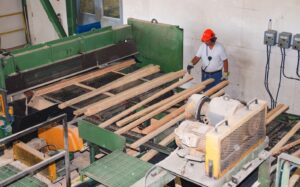 Duties on Canadian imports are driving up domestic sales at some Maine lumber companies. …Protection from historically lower Canadian lumber prices has given Pleasant River Lumber the confidence to add an additional manufacturing shift in Enfield, according to co-owner Jason Brochu. Photo by Katherine Emery. …Historically Canadian companies have both outbid them for timber harvested in Maine and undercut American lumber prices when they export the finished lumber product back across the border. …An industry analyst and two other mill leaders said that inflation and a sputtering housing market make it unclear whether the tariffs will have a positive or negative effect on business in the long run. The effects of the tariffs will also vary based on the different products sawmills make. …Sawmills rely on certainty, said Alden Robbins, of Robbins Lumber, and neither the markets nor foreign trade relationships have been stable recently.
Duties on Canadian imports are driving up domestic sales at some Maine lumber companies. …Protection from historically lower Canadian lumber prices has given Pleasant River Lumber the confidence to add an additional manufacturing shift in Enfield, according to co-owner Jason Brochu. Photo by Katherine Emery. …Historically Canadian companies have both outbid them for timber harvested in Maine and undercut American lumber prices when they export the finished lumber product back across the border. …An industry analyst and two other mill leaders said that inflation and a sputtering housing market make it unclear whether the tariffs will have a positive or negative effect on business in the long run. The effects of the tariffs will also vary based on the different products sawmills make. …Sawmills rely on certainty, said Alden Robbins, of Robbins Lumber, and neither the markets nor foreign trade relationships have been stable recently.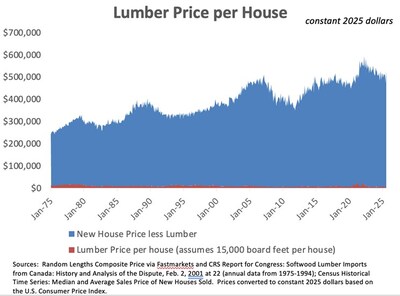
 Walk through any design-forward neighbourhood… and you’ll notice something the catalogues haven’t caught up with yet. The windows are changing. After decades dominated by vinyl, aluminium, and composite frames, timber is making a decisive return to high-end residential architecture. And the architects driving this shift aren’t motivated by nostalgia. They’re choosing wood because, for the homes they’re designing, nothing else performs quite the same way. The broader design world has been moving in this direction for several years. Mass timber construction, reclaimed wood interiors, rammed earth walls, natural stone — the 2025–2026 architectural conversation is dominated by what designers call “material honesty.” The idea is straightforward: use materials that are what they appear to be. No laminate pretending to be oak. …The knock against timber windows has always been practical: they need maintenance, they warp, they cost more. Two decades ago, much of that was fair. Modern engineered timber has changed the equation.
Walk through any design-forward neighbourhood… and you’ll notice something the catalogues haven’t caught up with yet. The windows are changing. After decades dominated by vinyl, aluminium, and composite frames, timber is making a decisive return to high-end residential architecture. And the architects driving this shift aren’t motivated by nostalgia. They’re choosing wood because, for the homes they’re designing, nothing else performs quite the same way. The broader design world has been moving in this direction for several years. Mass timber construction, reclaimed wood interiors, rammed earth walls, natural stone — the 2025–2026 architectural conversation is dominated by what designers call “material honesty.” The idea is straightforward: use materials that are what they appear to be. No laminate pretending to be oak. …The knock against timber windows has always been practical: they need maintenance, they warp, they cost more. Two decades ago, much of that was fair. Modern engineered timber has changed the equation. 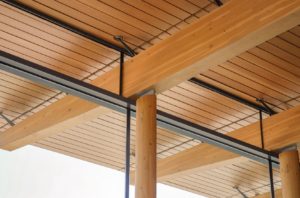 LANSING, Michigan – A state program to aid mass timber projects in Michigan has been extended for the Upper Peninsula after the region submitted no applications for funding in 2026. …A supplemental call for proposals makes available $50,000 through March 2. Those awards will be announced March 16. The awardees are:
LANSING, Michigan – A state program to aid mass timber projects in Michigan has been extended for the Upper Peninsula after the region submitted no applications for funding in 2026. …A supplemental call for proposals makes available $50,000 through March 2. Those awards will be announced March 16. The awardees are: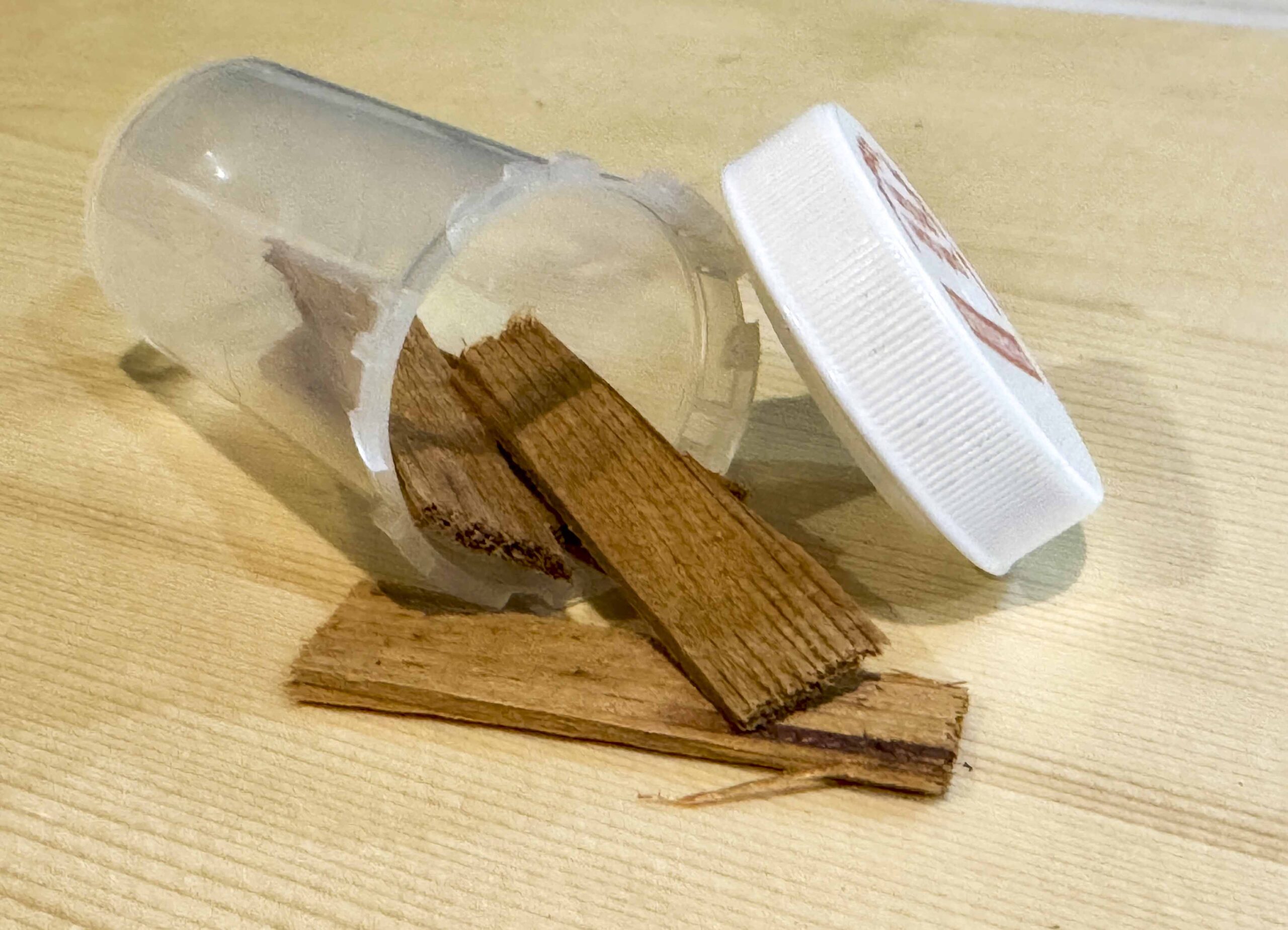 There are two types of suncream: chemical and physical. Chemical suncreams absorb the UV rays into heat … physical sunblocks scatter and reflect the UV rays on top of the skin. While they offer a broader spectrum of protection, their photo-catalytic nature and small particle size carry a potential risk. The synthetic compounds have adverse side effects on humans and the environment. …Wood is a material that is very effective at scattering light as a result of its cellular structure, absorbing light through one of its components, lignin. The compound is an organic polymer in the cells of many plants which makes them rigid and woody. It also offers sun protection factors (SPFs) that exceed 180. Lignin has a natural phenolic network that forms a shield against ultraviolet light, offering protection against the sun without the need for petroleum-based filters.The use of lignin as sun protection for skin is promising, particularly as a renewable and waste-free resource.
There are two types of suncream: chemical and physical. Chemical suncreams absorb the UV rays into heat … physical sunblocks scatter and reflect the UV rays on top of the skin. While they offer a broader spectrum of protection, their photo-catalytic nature and small particle size carry a potential risk. The synthetic compounds have adverse side effects on humans and the environment. …Wood is a material that is very effective at scattering light as a result of its cellular structure, absorbing light through one of its components, lignin. The compound is an organic polymer in the cells of many plants which makes them rigid and woody. It also offers sun protection factors (SPFs) that exceed 180. Lignin has a natural phenolic network that forms a shield against ultraviolet light, offering protection against the sun without the need for petroleum-based filters.The use of lignin as sun protection for skin is promising, particularly as a renewable and waste-free resource. 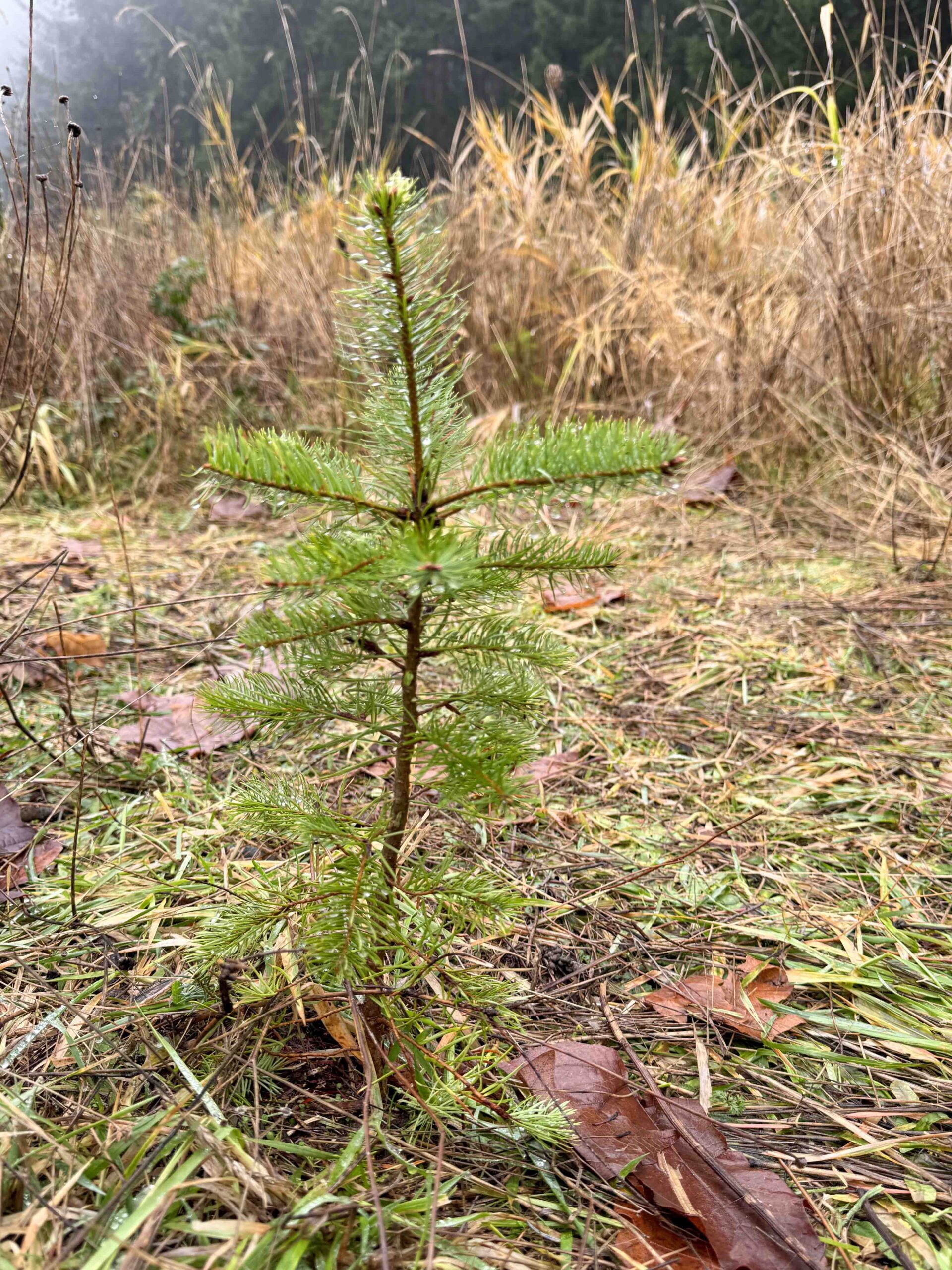 A national horticultural association is sounding the alarm after new data shows a “staggering gap” in Canada’s post-wildfire forest restoration efforts. The Canadian Tree Nursery Association (CTNA) says current programs are restoring only a small fraction of forests lost to recent wildfires and is calling for “immediate and substantive action” from provincial and federal governments to dramatically increase commitments to restoring wildfire-impacted forests. Speaking at the Western Forest Contractors Association Annual General Meeting and Conference in Victoria from Jan. 28-30, Rob Keen, RPF, Executive Director of the CTNA warned that more than 7.3 billion seedlings are required to restore just 15 per cent of the forests destroyed by wildfires between 2023 and 2025 – more than 10 times Canada’s current annual seedling production capacity. “The crisis is compounded by a troubling biological trend – the declining ability of forests to regenerate naturally after more frequent and higher-intensity wildfires,” said Keen.
A national horticultural association is sounding the alarm after new data shows a “staggering gap” in Canada’s post-wildfire forest restoration efforts. The Canadian Tree Nursery Association (CTNA) says current programs are restoring only a small fraction of forests lost to recent wildfires and is calling for “immediate and substantive action” from provincial and federal governments to dramatically increase commitments to restoring wildfire-impacted forests. Speaking at the Western Forest Contractors Association Annual General Meeting and Conference in Victoria from Jan. 28-30, Rob Keen, RPF, Executive Director of the CTNA warned that more than 7.3 billion seedlings are required to restore just 15 per cent of the forests destroyed by wildfires between 2023 and 2025 – more than 10 times Canada’s current annual seedling production capacity. “The crisis is compounded by a troubling biological trend – the declining ability of forests to regenerate naturally after more frequent and higher-intensity wildfires,” said Keen.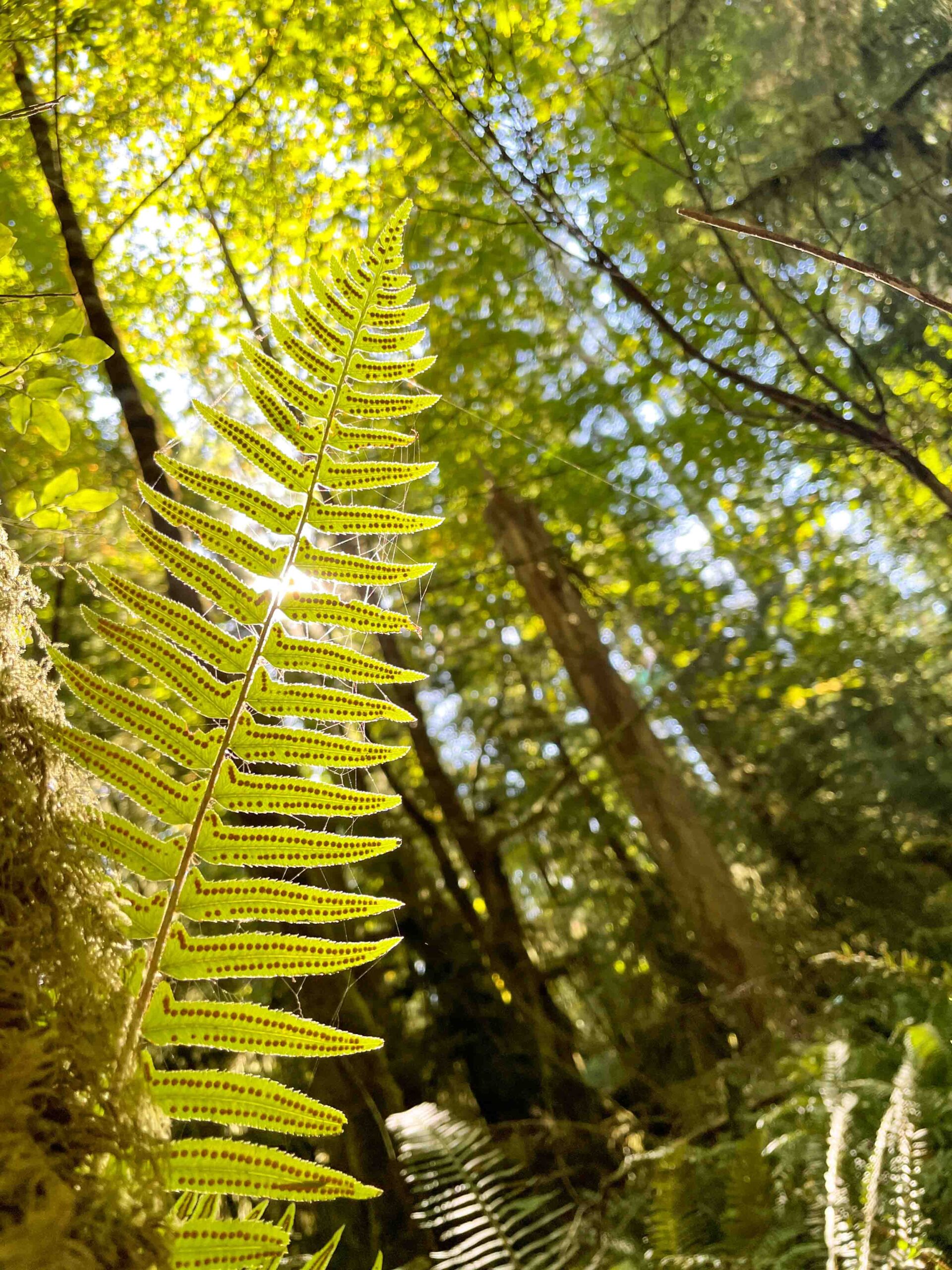 …the IISAAK OLAM Foundation, which promotes the establishment of Indigenous protected conservation areas … hosted the Estuary to Old Growth Gathering in Parksville, bringing together representatives from Nuu-chah-nulth, Coast Salish, Kwakwaka’wakw and Haida nations. …Concurrently, the B.C. Natural Resources Forum launched its “Forestry is a Solution” campaign in Prince George on Jan. 20. This push seeks support for the logging and manufacturing sector, stressing the need to “speed up access to economic wood by expediting permits and approvals”. Many of the industry’s leading associations are backing this campaign. “The coalition is asking British Columbians to voice their support for the workers and families that depend on forestry,” stated the B.C. Council of Forest Industries. …Not surprisingly, a Feb. 2 report from the Provincial Forestry Advisory Council stated that the days of “abundant access to low-cost fibre” are over. The report was presented as “a call to fundamentally reimagine our relationship with the land.”
…the IISAAK OLAM Foundation, which promotes the establishment of Indigenous protected conservation areas … hosted the Estuary to Old Growth Gathering in Parksville, bringing together representatives from Nuu-chah-nulth, Coast Salish, Kwakwaka’wakw and Haida nations. …Concurrently, the B.C. Natural Resources Forum launched its “Forestry is a Solution” campaign in Prince George on Jan. 20. This push seeks support for the logging and manufacturing sector, stressing the need to “speed up access to economic wood by expediting permits and approvals”. Many of the industry’s leading associations are backing this campaign. “The coalition is asking British Columbians to voice their support for the workers and families that depend on forestry,” stated the B.C. Council of Forest Industries. …Not surprisingly, a Feb. 2 report from the Provincial Forestry Advisory Council stated that the days of “abundant access to low-cost fibre” are over. The report was presented as “a call to fundamentally reimagine our relationship with the land.”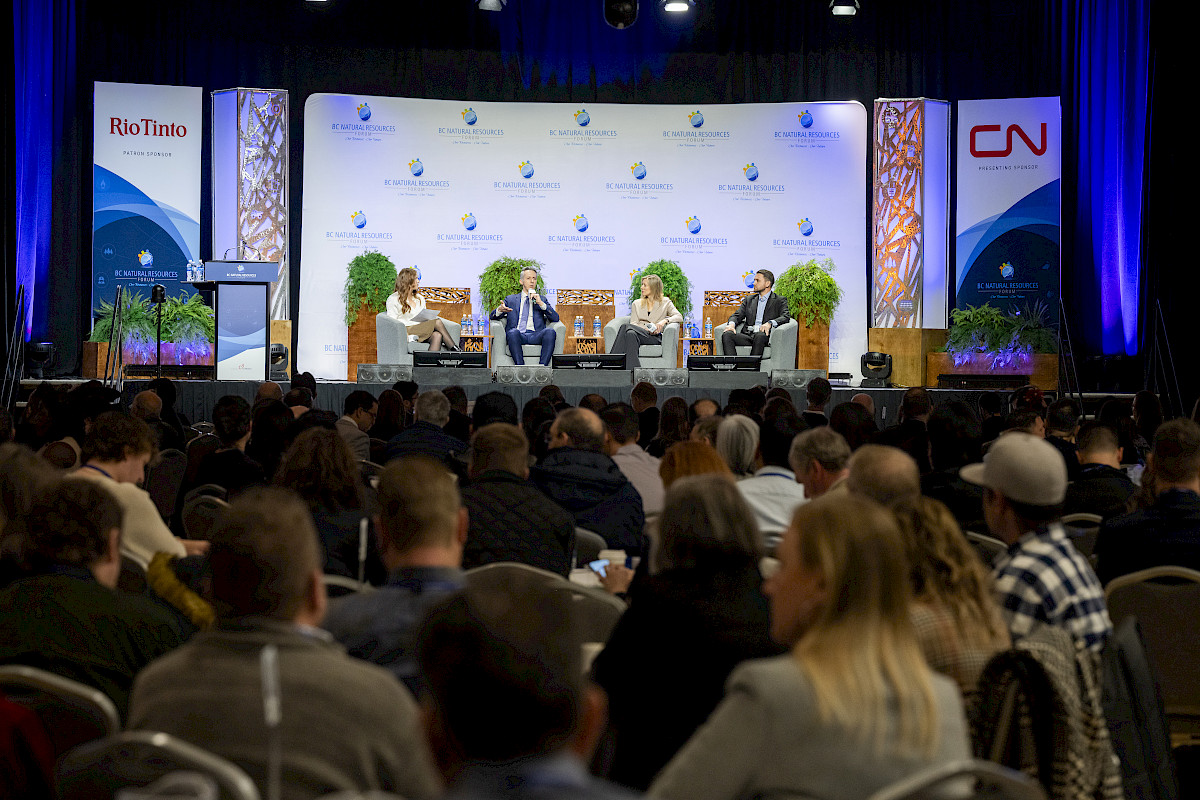
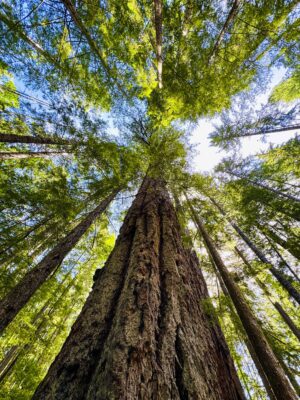 The Provincial Forest Advisory Committee’s (PFAC)
The Provincial Forest Advisory Committee’s (PFAC)  Forest harvesting events will be analyzed at an upcoming event at Maple Ridge’s UBC Research Forest. The event titled “Not-So-Clear-Cut: Rethinking How We Harvest Forests” is coming up on Feb. 21, in two sessions from 10 a.m. to 3 p.m. at the Malcolm Knapp Research Forest. Participants are invited to join Dr. Suzanne Simard, a professor and the author of Finding the Mother Tree, and Hélène Marcoux, director and forester at the Malcolm Knapp Research Forest, for a two-hour guided walk along hiking trails through the forest. As part of ongoing research exploring alternatives to clear-cuts, attendees can discover how tree retention forestry supports soil carbon and ecosystem resilience – all while exploring the challenges and trade-offs of logging in a living ecosystem.
Forest harvesting events will be analyzed at an upcoming event at Maple Ridge’s UBC Research Forest. The event titled “Not-So-Clear-Cut: Rethinking How We Harvest Forests” is coming up on Feb. 21, in two sessions from 10 a.m. to 3 p.m. at the Malcolm Knapp Research Forest. Participants are invited to join Dr. Suzanne Simard, a professor and the author of Finding the Mother Tree, and Hélène Marcoux, director and forester at the Malcolm Knapp Research Forest, for a two-hour guided walk along hiking trails through the forest. As part of ongoing research exploring alternatives to clear-cuts, attendees can discover how tree retention forestry supports soil carbon and ecosystem resilience – all while exploring the challenges and trade-offs of logging in a living ecosystem. BC NDP Forests Minister Ravi Parmar avoided the usual political pledges to accept recommendations from the latest in-depth analysis of the province’s troubled forest industry. The NDP government’s appointed experts, the Provincial Forest Advisory Committee, tabled their findings on February 2 after a six-month review of an industry that is moving from decline to collapse. …Parmar took the NDP’s familiar path, rather than address the sweeping recommendations to restructure the entire forest land base… he said the mill closures that are devastating communities across the province are mostly Donald Trump’s fault. …The
BC NDP Forests Minister Ravi Parmar avoided the usual political pledges to accept recommendations from the latest in-depth analysis of the province’s troubled forest industry. The NDP government’s appointed experts, the Provincial Forest Advisory Committee, tabled their findings on February 2 after a six-month review of an industry that is moving from decline to collapse. …Parmar took the NDP’s familiar path, rather than address the sweeping recommendations to restructure the entire forest land base… he said the mill closures that are devastating communities across the province are mostly Donald Trump’s fault. …The 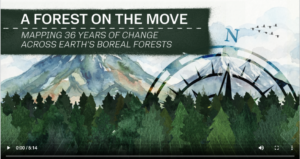 For the first time, researchers have been able to confirm that our planet’s boreal forests are on the move. Using nearly a quarter million Landsat satellite images spanning 36 years, scientists have confirmed for the first time that Earth’s boreal forest—the planet’s largest forested biome—is shifting northward, revealing unprecedented changes in this critical ecosystem that stores more than a third of the world’s forests and helps regulate our global climate. [5 min. video]
For the first time, researchers have been able to confirm that our planet’s boreal forests are on the move. Using nearly a quarter million Landsat satellite images spanning 36 years, scientists have confirmed for the first time that Earth’s boreal forest—the planet’s largest forested biome—is shifting northward, revealing unprecedented changes in this critical ecosystem that stores more than a third of the world’s forests and helps regulate our global climate. [5 min. video]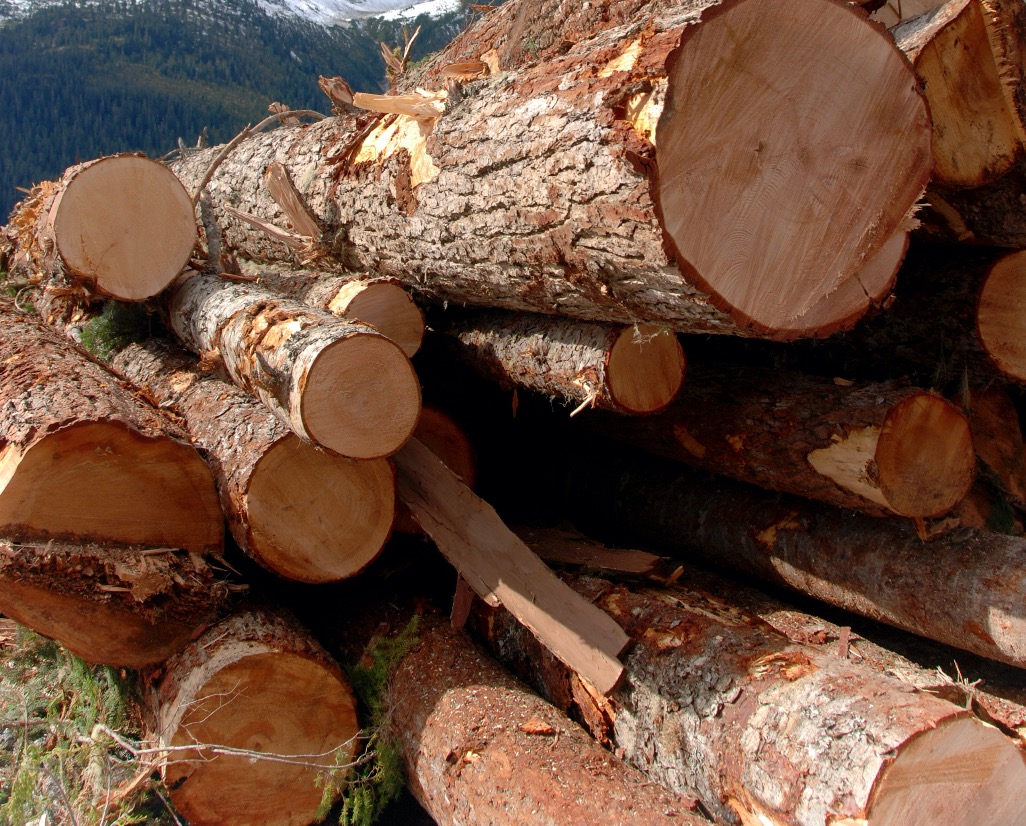 OLYMPIA, WA – Two Washington tribal leaders could soon sit on the state’s Board of Natural Resources, which guides logging sales and other management decisions on public land. Sen. Claudia Kauffman, a Democrat and first Native American woman to serve in the state Senate, proposed Senate Bill 5838. On Monday, it was voted out of the Senate Committee on Agriculture and Natural Resources. The bill originally called for only one tribal representative, but it was changed to two members as it moved through the committee process. The proposal is backed by Public Lands Commissioner Dave Upthegrove, who chairs the board and leads the Department of Natural Resources. The department requested the legislation. If enacted, the governor would appoint a tribal representative from each side of the Cascades… Eligible tribal members must hold an elected position in a federally recognized tribe whose reservation or treaty-ceded lands are in Washington.
OLYMPIA, WA – Two Washington tribal leaders could soon sit on the state’s Board of Natural Resources, which guides logging sales and other management decisions on public land. Sen. Claudia Kauffman, a Democrat and first Native American woman to serve in the state Senate, proposed Senate Bill 5838. On Monday, it was voted out of the Senate Committee on Agriculture and Natural Resources. The bill originally called for only one tribal representative, but it was changed to two members as it moved through the committee process. The proposal is backed by Public Lands Commissioner Dave Upthegrove, who chairs the board and leads the Department of Natural Resources. The department requested the legislation. If enacted, the governor would appoint a tribal representative from each side of the Cascades… Eligible tribal members must hold an elected position in a federally recognized tribe whose reservation or treaty-ceded lands are in Washington. University of Oregon Assistant Research Professor James Johnston said he was taught that when a large fire burned a moist, Western Cascade forest to the ground, and the area didn’t burn for hundreds of years afterward, that’s what created a complex, old-growth landscape. Instead, his study found that ancient tree stumps in the Mount Hood and Willamette National Forests had burn scars from multiple fires over their long lives. It’s the first time tree-ring scars have been used to document fire records in the region. Johnston said forests are complex because of—not in spite of—lower-severity wildfires which don’t kill many of the trees. …Johnston said to figure out the best ways to foster healthy forests, relatively recent upheavals also need to be considered. Those include clearcuts, human infrastructure at the margins of forests, and hotter and drier weather patterns.
University of Oregon Assistant Research Professor James Johnston said he was taught that when a large fire burned a moist, Western Cascade forest to the ground, and the area didn’t burn for hundreds of years afterward, that’s what created a complex, old-growth landscape. Instead, his study found that ancient tree stumps in the Mount Hood and Willamette National Forests had burn scars from multiple fires over their long lives. It’s the first time tree-ring scars have been used to document fire records in the region. Johnston said forests are complex because of—not in spite of—lower-severity wildfires which don’t kill many of the trees. …Johnston said to figure out the best ways to foster healthy forests, relatively recent upheavals also need to be considered. Those include clearcuts, human infrastructure at the margins of forests, and hotter and drier weather patterns.
 In a controversial study published in April last year, researchers described an astonishing phenomenon: a forest of Norway spruce trees (Picea abies) appeared to ‘sync’ their electrical signaling ahead of a partial solar eclipse. Now there’s a new theory about what was actually going on. Having examined the data, ecologists Ariel Novoplansky and Hezi Yizhaq from Ben-Gurion University of the Negev in Israel propose an explanation that’s not quite as sensational. Novoplansky and Yizhaq suggest that the electrical activity seen in the trees was caused by a temperature drop, a passing thunderstorm, and several local lightning strikes; factors that previous research has shown can trigger similar signaling responses in plants.
In a controversial study published in April last year, researchers described an astonishing phenomenon: a forest of Norway spruce trees (Picea abies) appeared to ‘sync’ their electrical signaling ahead of a partial solar eclipse. Now there’s a new theory about what was actually going on. Having examined the data, ecologists Ariel Novoplansky and Hezi Yizhaq from Ben-Gurion University of the Negev in Israel propose an explanation that’s not quite as sensational. Novoplansky and Yizhaq suggest that the electrical activity seen in the trees was caused by a temperature drop, a passing thunderstorm, and several local lightning strikes; factors that previous research has shown can trigger similar signaling responses in plants.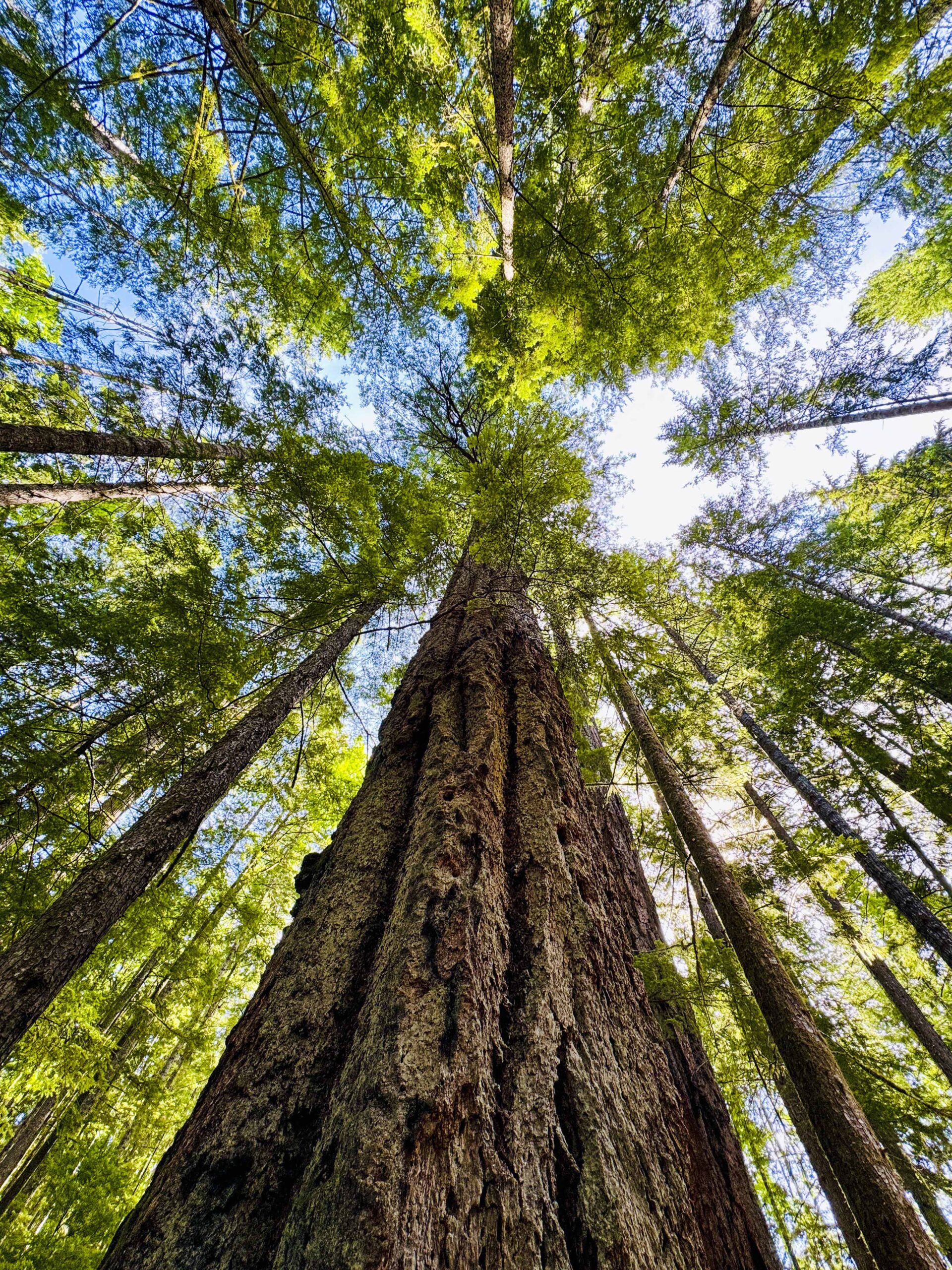 Forests around the world are quietly transforming, and not for the better. A massive global analysis of more than 31,000 tree species reveals that forests are becoming more uniform, increasingly dominated by fast-growing “sprinter” trees, while slow-growing, long-lived species are disappearing. These slower species act as the backbone of forest ecosystems, storing carbon, stabilizing environments, and supporting rich webs of life—especially in tropical regions where biodiversity is highest. …The research also highlights the growing role of naturalized tree species, meaning trees that originated elsewhere but now grow wild in new regions. Nearly 41 percent of these species share traits like rapid growth and small leaves, which help them survive in disturbed environments. …The study shows that tropical and subtropical regions are likely to experience the most severe impacts from forest homogenization. …According to the researchers, human actions are the main force behind these changes in forest composition. …This makes protecting slow-growing tree species increasingly urgent.
Forests around the world are quietly transforming, and not for the better. A massive global analysis of more than 31,000 tree species reveals that forests are becoming more uniform, increasingly dominated by fast-growing “sprinter” trees, while slow-growing, long-lived species are disappearing. These slower species act as the backbone of forest ecosystems, storing carbon, stabilizing environments, and supporting rich webs of life—especially in tropical regions where biodiversity is highest. …The research also highlights the growing role of naturalized tree species, meaning trees that originated elsewhere but now grow wild in new regions. Nearly 41 percent of these species share traits like rapid growth and small leaves, which help them survive in disturbed environments. …The study shows that tropical and subtropical regions are likely to experience the most severe impacts from forest homogenization. …According to the researchers, human actions are the main force behind these changes in forest composition. …This makes protecting slow-growing tree species increasingly urgent.
 Boreal ecosystems store twice as much carbon as the atmosphere and warm faster than the global average. The current paradigm based on boreal forests and tundra considers that warming will accelerate boreal carbon loss. However, the warming response of Sphagnum peatlands, storing ~40% of boreal carbon stocks, remains under-investigated. …investigations into two long-term warming experiments in Finnish peatlands, we demonstrate that warming enhances soil carbon accumulation in boreal Sphagnum peatlands. This result sharply contrasts with warming-induced carbon loss from boreal forests and tundra, owing to the unique metabolic response of Sphagnum… Our estimates suggest that warming-induced increase of soil carbon in boreal Sphagnum peatlands (assuming no hydrological changes or plant species shifts) may offset nearly half the boreal forest carbon-sink decline or heterotrophic respiration increases in Arctic tundra under warming. These findings highlight the vital but overlooked role of Sphagnum peatlands in counteracting boreal carbon loss under future warming.
Boreal ecosystems store twice as much carbon as the atmosphere and warm faster than the global average. The current paradigm based on boreal forests and tundra considers that warming will accelerate boreal carbon loss. However, the warming response of Sphagnum peatlands, storing ~40% of boreal carbon stocks, remains under-investigated. …investigations into two long-term warming experiments in Finnish peatlands, we demonstrate that warming enhances soil carbon accumulation in boreal Sphagnum peatlands. This result sharply contrasts with warming-induced carbon loss from boreal forests and tundra, owing to the unique metabolic response of Sphagnum… Our estimates suggest that warming-induced increase of soil carbon in boreal Sphagnum peatlands (assuming no hydrological changes or plant species shifts) may offset nearly half the boreal forest carbon-sink decline or heterotrophic respiration increases in Arctic tundra under warming. These findings highlight the vital but overlooked role of Sphagnum peatlands in counteracting boreal carbon loss under future warming.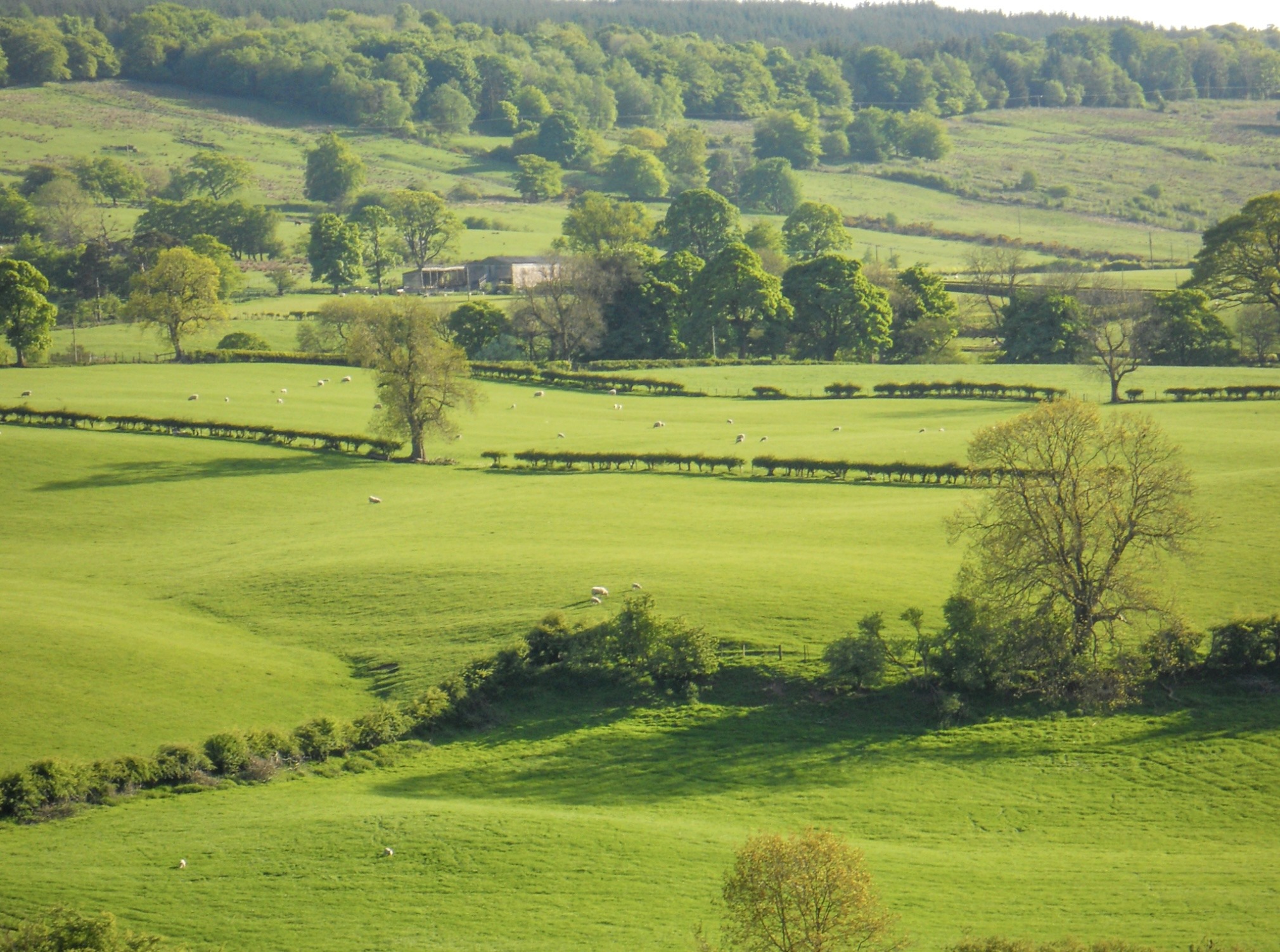 Scotland would have to plant several hundred thousand hectares of new woodland to achieve net-zero carbon emissions in the livestock sector by 2050 through afforestation alone, a new study has shown. The study by The James Hutton Institute, which was recently published in the journal Science of The Total Environment, investigated how multi-functional afforestation and livestock reduction could contribute to helping Scotland achieve net-zero emissions in the livestock sector by 2050. This goal aligns with the Paris Agreement on climate change. Researchers have simulated a scenario in which approximately 30,000ha per year of new woodland and agroforestry were planted in Scotland between 2020 and 2025. …It is often assumed such planting can only occur at the expense of grazing area, so the researchers coupled this planting effort with a linear decrease in livestock, with an estimated total reduction of approximately 50% of the present herd numbers.
Scotland would have to plant several hundred thousand hectares of new woodland to achieve net-zero carbon emissions in the livestock sector by 2050 through afforestation alone, a new study has shown. The study by The James Hutton Institute, which was recently published in the journal Science of The Total Environment, investigated how multi-functional afforestation and livestock reduction could contribute to helping Scotland achieve net-zero emissions in the livestock sector by 2050. This goal aligns with the Paris Agreement on climate change. Researchers have simulated a scenario in which approximately 30,000ha per year of new woodland and agroforestry were planted in Scotland between 2020 and 2025. …It is often assumed such planting can only occur at the expense of grazing area, so the researchers coupled this planting effort with a linear decrease in livestock, with an estimated total reduction of approximately 50% of the present herd numbers.